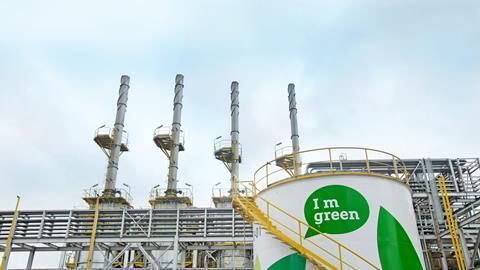For fifteen years, petrochemical company Braskem has been working hard on developing biobased polymers, like I’m green™ bio-based polyethylene.
Plastics such as polyethylene (PE) play a significant role in our daily lives, but innovation in the production of plastics using recyclable raw materials that capture CO2 continues to gain ground in the industry. ‘The production of most plastics releases greenhouse gases’, says Roger Marchioni, Global Commercial Director of Biopolymers for the brand I’m green™ bio-based at Braskem. ‘But our bio-based polyethylene does exactly the opposite. We produce it using ethanol derived from sugar cane, which captures CO₂ during its growth process. The global average CO2 emissions for PE are three kilograms per kilogram of plastic. However, with our I’m green™ bio-based product, we can capture 2.12 kilograms of CO2 equivalents per kilogram of plastic between the cradle and the factory gate.’
Environment, society and human rights
I’m green™ bio-based products are designed to be more than just recyclable. ‘We believe it is important to obtain raw materials in a sustainable manner, both from sugar cane fields and from ethanol producers’, says Marchioni. ‘We want to comply with the most important sustainable practices in the areas of the environment, society, and human rights.’
The most interesting aspect of I’m green™ bio-based products is that they are traceable, enabling us to determine exactly how much of a product consists of recyclable raw materials. ‘Carbon dating allows you to trace the molecules back to the products’, explains Marchioni. ‘This enables you to determine precisely how much of a product has been produced using I’m green™ bio-based materials.’ This traceability distinguishes Braskem’s brand from other companies offering bio-based materials. ‘Furthermore, our I’m green™ bio-based PE can be recycled in existing streams and is a drop-in solution, meaning processors do not need to change their processes.’
Dehydration plant
Although acceptance of bio-based materials still depends on companies abandoning fossil-based materials, Braskem increased the capacity of its ethanol dehydration plant in Triunfo, Brazil — which produces ethanol for I’m green™ bio-based products — from 200,000 to 275,000 tonnes per year in 2023. ‘It is the only industrial dehydration plant in the world’, says Marchioni. ‘We are also seeing a voluntary shift towards the use of more bio-based raw materials in certain segments.’ There is greater interest in switching from fossil-based to bio-based raw materials for certain products, such as toys, tennis shoes, artificial turf and food packaging. ‘We are expanding our portfolio to meet the needs of companies that want to reduce their fossil carbon content.’
Marchioni believes it is crucial to keep an eye on how countries are developing their ‘green’ policies and regulations. ‘At the moment, a lot of attention is being paid to plastic waste and recycling, but we also need to look at the bigger picture and consider how using bio-based products could positively impact climate change.’ However, according to the commercial director, there is still some uncertainty at the moment. ‘Clarity about these regulations is crucial for investment continuity. But in the meantime, our strategy remains unchanged: we are continuing full steam ahead on the green path.’
Braskem will be present at the K 2025 conference in Düsseldorf from 8 to 15 October.













Nog geen opmerkingen